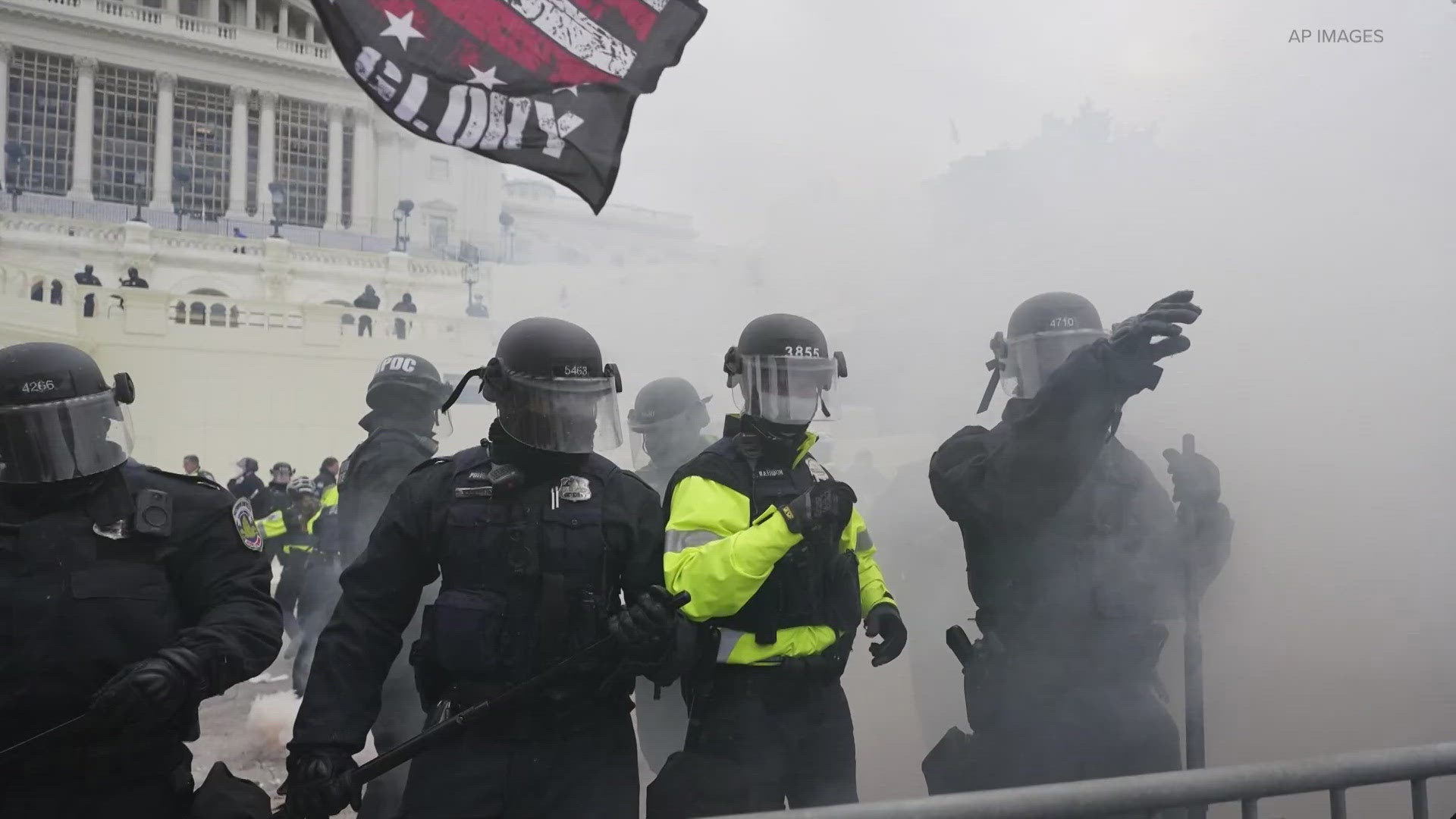WASHINGTON — Federal prosecutors say a Jan. 6 defendant and apparent sovereign citizen who was on the lam for 10 months after failing to show for trial last year should be barred from further representing himself.
Victor Sean Dennison, of California, was arrested for the first time in January 2023 on four misdemeanors counts for allegedly entering the U.S. Capitol on Jan. 6 after noticing the doors who’d been breached. Dennison, who was wearing an “All Aboard the Trump Train” hat, reportedly told investigators he’d seen a man holding a hammer near a smashed window before he entered.
Dennison, who is not a lawyer, elected to represent himself and was scheduled to begin trial before U.S. District Judge Trevor McFadden in June of that same year. He instead failed to appear and McFadden issued a bench warrant for his arrest.
Dennison remained on the lam until May, when he was arrested during an FBI raid on a condo in Clearwater, Florida. U.S. Marshals brought him back to D.C., where McFadden ordered him detained without bond while he awaits his new trial date in August.


Earlier this month, federal prosecutors filed a motion asking McFadden to terminate Dennison’s self-representation and appoint a lawyer to represent him. While Americans have a right to represent themselves in criminal cases under the 1975 U.S. Supreme Court decision Faretta v. California, that right is not absolute. The Supreme Court said judges can refuse to allow self-representation if a defendant “deliberately engages in serious and obstructionist misconduct.” Prosecutors said Dennison had met that bar.
“Most obviously, Dennison chose not to attend his own trial, and fled from capture for nearly a year. Dennison has also obstructed nearly every hearing he has been a part of in this case,” prosecutors wrote. “On February 17, 2023, for instance, Dennison was scheduled to be arraigned, but was so disruptive that he had to be detained for several days. Then, after failing to appear for his jury trial in June 2023 and actively attempting to evade law enforcement, on May 29, 2024, Dennison again had to be removed from the courtroom during his arraignment on the superseding criminal information because he would not listen or respond to the Court.”
Prosecutors said Dennison had also refused to respond to any of the government’s motions and had himself filed “incoherent” documents claiming the court had no authority over him.
Prior to fleeing, Dennison’s case had been marked by unusual filings in which he appeared to echo common phrases from the sovereign citizen movement – a loosely organized right-wing ideology that believes “virtually all existing government in the United States is illegitimate,” according to the Anti-Defamation League.
In one letter, which was sent to standby counsel and Justice Department attorneys and filed to the public docket by McFadden, Dennison refers to himself variously as the “beneficiary” of his trust, an “American Freeman,” a “living breathing man” and as “Victor Sean of Dennison, trust protector.” Sovereign citizens often claim they are not citizens of the United States but rather “sovereign” unto themselves and, therefore, “freed from the jurisdiction of the ‘de facto’ government and courts,” according to the ADL. Sovereign citizens also frequently insist there is a distinction between their “living person” and the corporate trust, sometimes referred to as a “dead entity,” they believe the government created when they were born to unwittingly force them into a contract. Dennison referenced those ideas repeatedly in his letter.
“You cannot represent a living man,” Dennison wrote to his standby counsel. “I’m a living man. An attorney can only represent the dead. When you use the words ‘you’ and ‘your’ are you referring to a dead entity? Are you trying to summon the dead? Or do you mean the living breathing man?”
“Let it be known, the Provost Marshal has been noticed,” Dennison also warned cryptically – an apparent reference to a belief held by some sovereign citizens, according to a 2015 FBI briefing, that military authorities will intervene in the event of their arrest or prosecution.
Dennison is neither the first Jan. 6 defendant to espouse sovereign citizen rhetoric nor to choose to represent himself at trial. In January, Marc Bru, a Proud Boy from Washington state who also absconded before his trial, was sentenced to six years in prison on felony counts of civil disorder and obstruction of an official proceeding. Bru declined to offer any defense during his trial and said almost nothing, save that he did not consent to the proceeding.
“You are outside of your jurisdiction,” Bru told D.C. District Chief Judge James Boasberg in lieu of giving a closing argument. “You have trafficked me and you have committed war crimes against me.”
Last December, another judge sentenced former police chief Alan Hostetter to 11 years in prison for helming a conspiracy to bring weapons to the U.S. Capitol. Hostetter, a member of the anti-government Three Percenters movement, chose to represent himself at trial but did ask for standby counsel – although he requested they have no association with Skull & Bones, Free Masonry or “any other organizations that require oaths or vows of secrecy.” Hostetter’s defense at trial amounted to claiming that Jan. 6 was a government conspiracy to allow the Capitol to be overrun by supporters of former President Donald Trump. Hostetter doubled down during his sentencing hearing and claimed the fatal shooting of Air Force veteran Ashli Babbitt while she attempted to breach a door inside the Capitol was a “psy op.”
In August, McFadden presided over the trial of another pro se defendant, Brandon Fellows, who was ultimately convicted of one felony count of obstruction of an official proceeding and four misdemeanors for his role in the Capitol riot. In addition to 37 months in prison for the Jan. 6 offenses, McFadden also sentenced Fellows to five months for contempt of court based on his behavior at trial. Fellows was ordered to serve his contempt sentence consecutive to his Jan. 6 sentence and has since been released.
As of Tuesday, Dennison had not responded to the government’s motion to terminate his self-representation. He was scheduled to appear in court next on July 15.
Dennison was scheduled to begin a jury trial on Aug. 26. In addition to the four misdemeanors he was originally charged with, Dennison now faces an additional count of failure to appear. Under federal law, failure to appear carries a maximum sentence of up to one year in prison which must be served consecutive to any sentence for other charged offenses.

